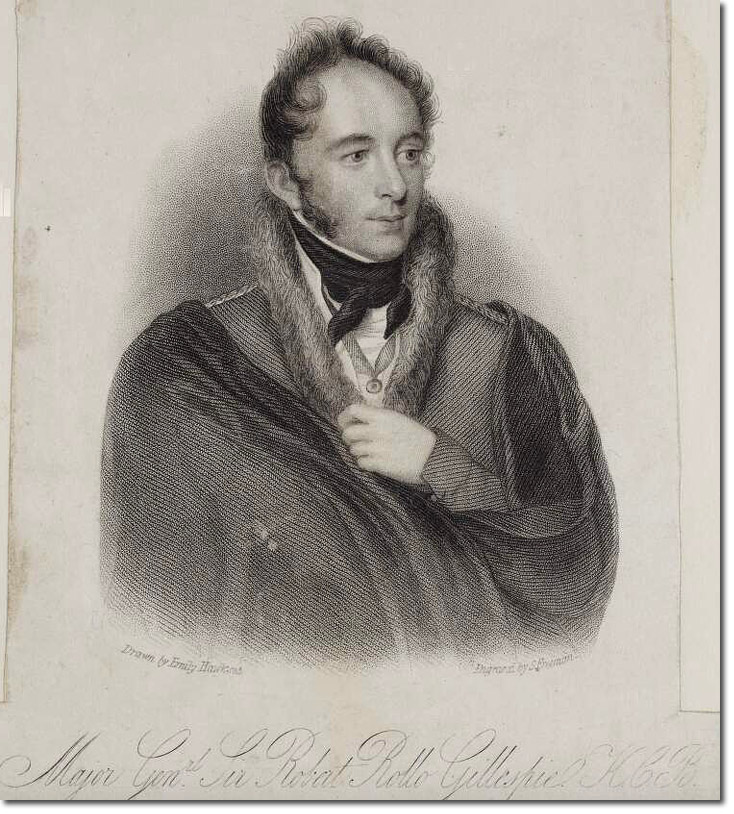|
|


|
|
Robert Rollo Gillespie was born on 21 Jan 1766 in Comber, County Down. He was sent to school in England and in 1783 was commissioned into the 3rd Irish Horse (6th Dragoon Guards). He was physically strong and hot-headed. When in Ireland with the Carabiniers he acquired a certain notoriety as a result of a duel in which he acted as second to a brother officer. The duellists exchanged shots twice without effect, and an attempt was made to settle the the matter amicably. This aroused Gillespie's scorn to such an extent that the affair ended with himself and the opposing duellist, a youth by the name of Barrington, exchanging shots across a handkerchief. Barrington was killed and Gillespie fled to Scotland. He eventually gave himself up and was tried for murder in 1788. He was acquitted after a verdict of justifiable homicide was reached.
Lieutenant Gillespie transferred to the 20th Light Dragoons in 1792, but on the way to the West Indies his ship was wrecked off Madeira. There he contracted yellow fever on his first night ashore, but he recovered and on reaching his regiment volunteered to take part in the expedition to St Domingo while the rest of the regiment remained in Jamaica. At some point he was appointed adjutant-general of St Domingo, and was asleep in his house when 8 men broke in to burgle it. Armed with his sword he took them on and killed 6 of them. He had greatly distinguished himself in St Domingo and was promoted to captain soon afterwards. He was given command of the regiment in 1797 when George Churchill was promoted to major-general. He held the rank of major at the time and was not promoted to lieutenant-colonel until 1799. The 20th Light Dragoons were ordered back to Britain in 1802 and Gillespie was granted 100 guineas by the Jamaican House of Assembly in recognition of his service to the island. The money was for him to purchase a special presentation sword. When they arrived back in England Gillespie was court-martialled at the instigation of a brother officer, Major Cameron. He was accused of drawing pay for dead men, a common practice in those days. But his defence was that he used the money for the good of the regiment, not to line his own pockets. Gillespie was honourably acquitted in 1804, and Cameron was kicked out of the army. Rollo Gillespie went to India to take command of the 19th Light Dragoons. There he performed a great feat of bravery during the Vellore Mutiny of 1806. He galloped to the rescue of the fort held by the 69th Regiment who had run out of ammunition. He reached the fort before his cavalry force and climbed the walls by rope to lead the men in a bayonet charge on the ramparts against the mutineers. When his cavalry and artillery force arrived they blew in the gates and the cavalry were able to get amongst the enemy to force them to disperse. In 1811 he commanded the men who took part in the invasion of Java and commanded the occupying force. On his return to India there was an incident where a tiger escaped from a cage and was loose on the Bangalore racecourse; Rollo killed it with a spear. In October 1814 he led a column to attack Kalanga in the Nepal War against the Gurkhas. In the battle of Nalapani on 31 Oct 1814 he tried to force his way into the fort at the head of a party of 8th Light Dragoons, but it failed, and he renewed the attack with companies of the 53rd Foot. Thirty yards from the fort he shouted "One shot more for the honour of Down" and charged with the men. But a Nepalese sniper shot him through the heart and he died on the spot. He was a major-general when he died, and was posthumously awarded the KCB on 1 Jan 1815. A statue of Rollo Gillespie stands on a 55 ft high column in the town square of Comber, County Down. It was erected in 1845 and unveiled on 24 June. 50 lodges of the Masonic Order were present, the largest gathering of Masons in Irish history. |
Regimental Details | Commanding Officers
Armed Forces | Art and Culture | Articles | Biographies | Colonies | Discussion | Glossary | Home | Library | Links | Map Room | Sources and Media | Science and Technology | Search | Student Zone | Timelines | TV & Film | Wargames